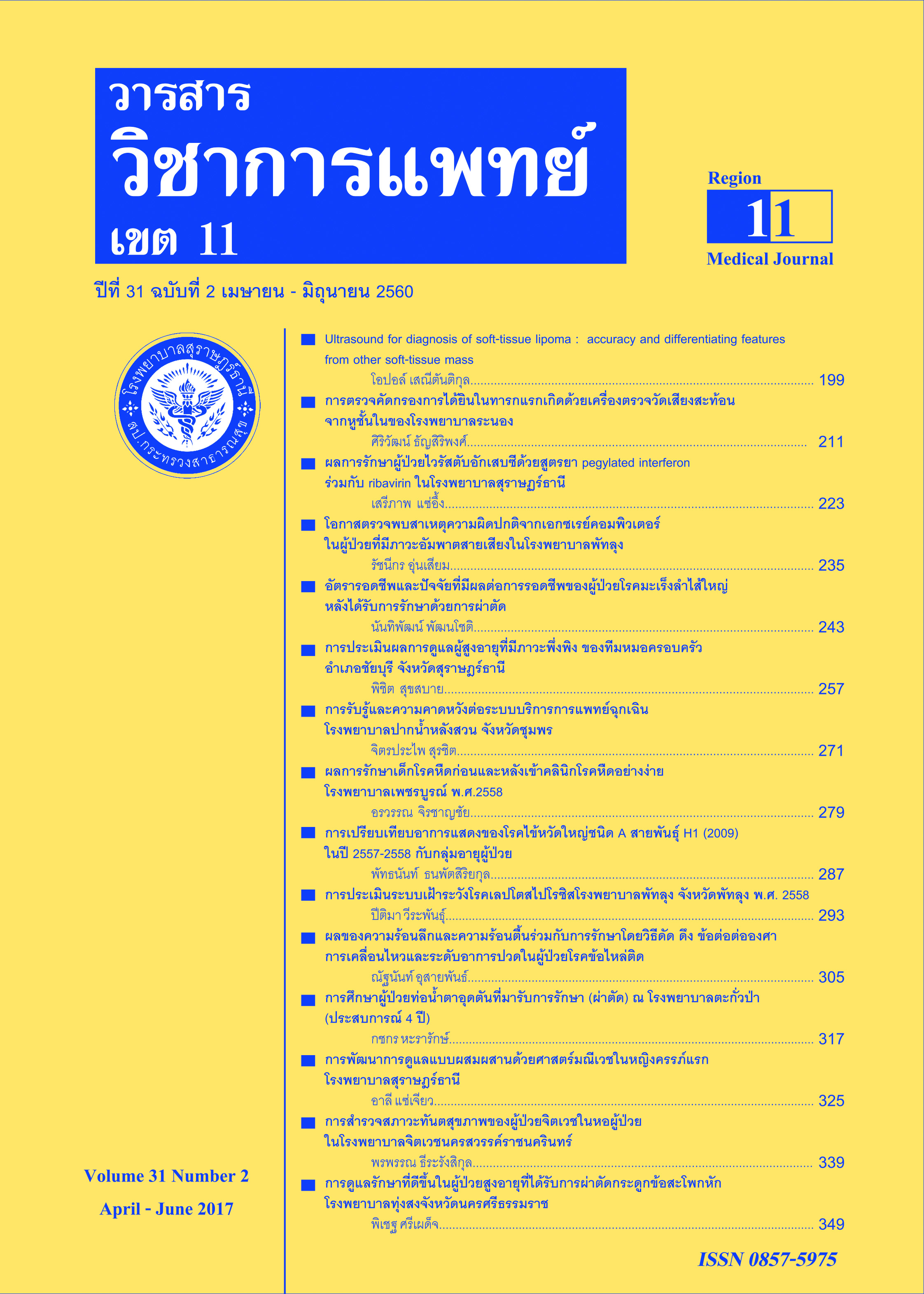Treatment outcomes in the management of patients with chronic viral hepatitis C with pegylated interferon and ribavirin in Suratthani hospital
Keywords:
Treatment outcome, chronic viral hepatitis C infection, pegylated interferon, ribavirinAbstract
Background : Treatment guideline recommend the use of pegylated interferon combination with ribavirin for chronic viral hepatitis C infection as a standard of care. While the efficacy of pegylated interferon and ribavirin has been proven by many global trials, the effectiveness and serious adverse events of such therapy has not been investigated in Suratthani hospital.
Objectives : To assess treatment outcomes of pegylated interferon and ribavirin in the management of patients with noncirrhotic chronic viral hepatitis C and hepatitis C virus-related compensated cirrhosis in Suratthani hospital. Primary outcome is efficacy of treatments, defined by sustained virological response (SVR). Secondary outcomes are prevalence of HCV genotypes and serious adverse event of treatment.
Methods : Retrospective study of 100 cases who were diagnosed of chronic viral hepatitis C infection between January 1st, 2013 and June 30th,2015 in Suratthani hosptial. 93 cases with sufficient data were enrolled into the study.The patients were treated by one of two regimens; pegylated interferon alfa 2a at dose of 180 mcg per week or pegylated interferon alfa 2b at standard dose of 1.0-1.5 mcg per kilogram per week, plus ribavirin at dose 800-1400 mg per day for 24-48 week, duration of treatment depended on HCV genotype and cirrhotic status.
Results : Among 93 patients who were treated with pegylated interferon alfa and ribavirin, overall rate of sustained virological response is 74.2%. The number of patients who received pegylated interferon alfa-2a was higher than those received pegylated interferon alfa-2b(57.0% vs43.0%). Prevalence of HCV
genotype in this study are 3(64.5%),1(29%)and 6(6.5%). A higher proportion of patients were non-cirrhotic chronic viral hepatitis C infection(59.1%). For non-cirrhotic group, sustained virological response rate were 78.6%, 80.6% and 80.0% in genotype 1, 3 and 6 respectively. Sustained virological response rate were
decreased in cirrhotic group of genotype 1 (53.8%) and 3 (70.8%) but increased rate in genotype 6 (100%). There were 9 patients (9.7%) who have HCV-HIV co infection. Only 5 patients (5.4%) have stopped treatment due to serious hematologic adverse events and dead from liver related disease.
Conclusion : Successful treatment outcomes were found in the management of chronic hepatitis C with the standard treatment of pegylated interferon and ribavirin in Suratthani hospital. This study provided useful information about treatment paradigms in the chronic viral hepatitis C patients in Suratthani hospital.
References
2. Lavanchy D. Evolving epidemiology of hepatitis C virus. Clin Microbiol Infect. 2011;17(2):107-15.
3. Wasitthankasem R, Vongpunsawad S, Siripon N, Suya C, Chulothok P, Chaiear K, et al. Genotypic distribution of hepatitis C virus in Thailand and Southeast Asia. PLoS One. 2015;10(5):e0126764.
4. EASL Clinical Practice Guidelines: management of hepatitis C virus infection. J Hepatol. 2014;60(2):392-420.
5. Hepatitis C guidance: AASLD-IDSA recommendations for testing, managing, and treating adults infected with hepatitis C virus. Hepatology. 2015;62(3):932-54.
6. van der Meer AJ, Veldt BJ, Feld JJ, Wedemeyer H, Dufour JF, Lammert F, et al. Association between sustained virological response and all-cause mortality among patients with chronic hepatitis C and advanced hepatic fibrosis. JAMA. 2012;308(24):2584-93.
7. Bruno S, Maisonneuve P. Response to the letter regarding the manuscript "Survival of patients with HCV cirrhosis and sustained virologic response is similar to the general population". J Hepatol. 2017 Apr 20.
8. Chiba T, Matsuzaki Y, Abei M, Shoda J, Aikawa T, Tanaka N, et al. Multivariate analysis of risk factors for hepatocellular carcinoma in patients with hepatitis C virus-related liver cirrhosis. J Gastroenterol. 1996;31(4):552-8.
9. Antaki N, Craxi A, Kamal S, Moucari R, Van der Merwe S, Haffar S, et al. The neglected hepatitis C virus genotypes 4, 5 and 6: an international consensus report. Liver Int. 2010;30(3):342-55.
10. Jung CH, Um SH, Kim TH, Yim SY, Suh SJ, Yim HJ, et al. Treatment Response and Long-Term Outcome of Peginterferon alpha and Ribavirin Therapy in Korean Patients with Chronic Hepatitis C. Gut Liver. 2016;10(5):808-17.






